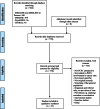Primary Care Physicians' Perspectives of Their Role in Cancer Care: A Systematic Review
- PMID: 27220499
- PMCID: PMC5023605
- DOI: 10.1007/s11606-016-3746-7
Primary Care Physicians' Perspectives of Their Role in Cancer Care: A Systematic Review
Abstract
Background: As survival rates improve, cancer is increasingly considered a chronic illness associated with significant long-term burden and sequelae, both physical and psychological. Various models of cancer care, including primary care physician (PCP)-led and shared-care, have been proposed, though a systematic review of PCPs' perspectives of their role and challenges in providing cancer care remains lacking. This systematic review summarises available literature on PCPs' perspectives of their role in cancer care.
Methods: Five databases (MEDLINE, MEDLINE In-Process, EMBASE, PsycINFO and CINAHL) were systematically searched using keywords and MeSH headings for articles from 1993-2015 exploring PCPs' views of their role in the care of patients/survivors of both child and adult cancers. Two independent reviewers screened abstracts for full-text review, abstracted data and performed a quality assessment.
Results: Thirty-five articles representing the perspectives of 10,941 PCPs were captured. PCPs' confidence to provide care varied according to cancer phase (e.g. treatment versus survivorship), care domain (e.g. acute medical care versus psychological late effects), and disease prevalence (e.g. breast malignancies versus childhood cancers), with preferences for shared- versus independent-care models varying accordingly. Barriers included a lack of timely and specific information/communication from oncologists and limited knowledge/lack of guidelines, as well as lack of time, remuneration and patient trust.
Limitations: The data was limited by a lack of consideration of the preferences of patients and oncologists, leading to uncertainty about the acceptability and feasibility of suggested changes to cancer care.
Discussion: PCPs appear willing to provide cancer care for patients/survivors; however, they report barriers and unmet needs related to providing such care. Future research/interventions should take into account the preferences and needs of PCPs.
Keywords: cancer; care management; care transitions; physician satisfaction; primary care.
Conflict of interest statement
Compliance with Ethical Standards Funding This study was funded by the Kids Cancer Alliance, which is supported by a translational research grant from the Cancer Institute of NSW. Claire Wakefield is supported by a Career Development Fellowship from the National Health and Medical Research Council of Australia (APP1067501). The Behavioural Sciences Unit is supported by the Kids with Cancer Foundation. Study sponsors did not have any input into the study design, data collection or analysis, report composition or editing, or publication decisions. Conflict of interest statement The authors declare that they do not have a conflict of interest.
Figures
References
-
- Australian Institute of Health and Welfare. Older Australia at a glance (4th ed.). Australian Government Department of Health and Ageing, 2007.
-
- Seehusen DA, Baird D, Bode D. Primary care of adult survivors of childhood cancer. Am Fam Physician. 2010;81(10):1250. - PubMed
Publication types
MeSH terms
LinkOut - more resources
Full Text Sources
Other Literature Sources
Research Materials


